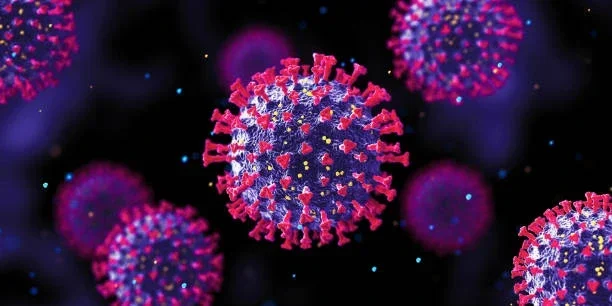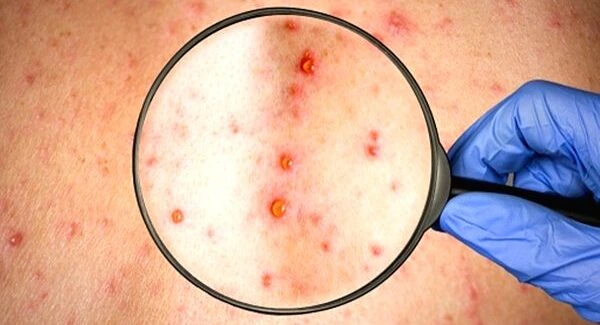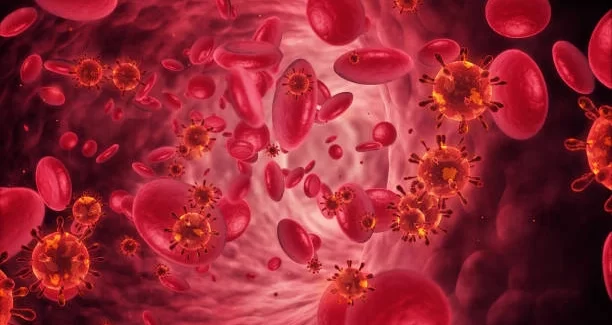Know All about Coronavirus disease 2019 (COVID-19)

Posted Date: February 7th, 2023
COVID-19, also known as the novel coronavirus is a highly contagious respiratory illness caused by the severe acute respiratory syndrome coronavirus 2 (SARS-CoV-2). It was first identified in Wuhan, China in December 2019 and has since become a global pandemic affecting millions of people worldwide.
COVID-19 primarily spreads through respiratory droplets when an infected person talks, coughs or sneezes. Symptoms of the virus can range from mild to severe and can include fever, cough, fatigue, body aches and shortness of breath. Some people may also experience loss of taste or smell. In severe cases the virus can lead to hospitalization and even death, especially in older adults and those with underlying health conditions.
To prevent the spread of COVID-19, public health officials have recommended measures such as wearing a mask, practicing good hand hygiene, maintaining physical distance from others and avoiding large gatherings. Vaccines have also been developed and are being distributed globally, offering a key tool in the fight against the virus.
Despite the availability of vaccines and other preventive measures, the pandemic continues to affect communities around the world, with new variants emerging and causing concern. As the world continues to grapple with the impacts of COVID-19 it is crucial for individuals to stay informed, follow public health guidance and take proactive steps to protect themselves and their communities.
What tests are used to diagnose COVID-19?
There are several tests available to diagnose COVID-19 including:
Polymerase Chain Reaction (PCR) test: The most commonly used test for diagnosing COVID-19 it detects the genetic material of the virus from a nasal or throat swab.
Antigen test: A rapid test that can detect the presence of the virus by detecting specific proteins in a nasal or throat swab.
Antibody test: A blood test that can detect the presence of antibodies produced in response to the virus, indicating prior exposure to the virus.
Serological test: A blood test that detects the presence of antibodies produced in response to the virus and can indicate prior exposure and potential immunity.
It’s important to note that different tests may have varying levels of accuracy and some tests may be more suitable for certain situations or populations. A healthcare professional can help determine the best test for an individual’s needs.
COVID-19 Vaccines & Immunization
COVID-19 vaccines are a crucial tool in the fight against the pandemic. They work by training the body’s immune system to recognize and fight the virus, thereby reducing the risk of severe illness, hospitalization and death. Several vaccine options have been developed and are being distributed globally including vaccines from Pfizer-BioNTech, Moderna, AstraZeneca and Johnson & Johnson among others.
Vaccination is recommended for individuals who are eligible including those who are at increased risk for severe illness and complications from COVID-19 as well as frontline workers and essential workers. Vaccination is also recommended for individuals who have recovered from COVID-19 as reinfection is possible.
Getting vaccinated is an important step in protecting oneself and others as well as helping to slow the spread of the virus. However it is important to note that vaccination does not guarantee complete protection from COVID-19 and individuals should continue to follow public health guidance such as wearing masks, practicing good hand hygiene and avoiding large gatherings.
Immunization is a key part of the global response to COVID-19 and it is crucial for individuals to get vaccinated and encourage others to do the same. With continued efforts to increase vaccine access and distribution, the world is on the path to controlling the pandemic and returning to a sense of normalcy.
Who can take the vaccine?
Eligibility criteria for COVID-19 vaccines vary by country and can change as the pandemic evolves. However generally speaking the following groups are eligible for vaccination:
Frontline and essential workers, such as healthcare workers, first responders and essential service workers.
Older adults, as they are at increased risk for severe illness and complications from COVID-19.
Individuals with underlying health conditions that increase the risk of severe illness such as heart disease, diabetes and lung disease.
Individuals who have recovered from COVID-19, as reinfection is possible.
Adolescents and young adults in some countries.
It is important to check with your local health department or healthcare provider to confirm your eligibility and to make an appointment for vaccination if you are eligible. It is also recommended to get the most up-to-date information on vaccine availability, eligibility and distribution.
COVID-19 Dos and don’ts after vaccination
Here are some dos and don’ts to follow after receiving a COVID-19 vaccine:
Dos:
Continue to practice preventive measures such as wearing masks, washing hands frequently and avoiding large gatherings, even after being vaccinated.
Get the full recommended dosage and complete the vaccine series if required.
Report any symptoms or adverse reactions to your healthcare provider.
Stay informed about the latest recommendations and guidelines.
Don’ts:
Avoid spreading misinformation about the vaccine and rely on trusted sources for information.
Don’t skip preventive measures like masks and hand hygiene just because you have been vaccinated.
Don’t believe in false claims about the vaccine being harmful or unnecessary.
Don’t ignore recommended guidelines from public health officials and healthcare providers.
Getting vaccinated is a crucial step in controlling the spread of COVID-19 and helping to return to a sense of normalcy, but it is important to continue following public health guidance and take necessary precautions. It is also important to remember that vaccination does not guarantee complete protection from COVID-19 and individuals should continue to take necessary measures to protect themselves and others.
What is the incubation period for COVID-19?
The incubation period of COVID-19 is the time between exposure to the virus and the onset of symptoms. On average, the incubation period is estimated to be 5-6 days, but it can range from 1-14 days. This means that an individual may be contagious and spread the virus to others before they even experience symptoms.
It is important to note that some individuals may not develop symptoms after being infected, but they can still spread the virus to others. This highlights the importance of following public health measures such as wearing masks, practicing good hand hygiene and avoiding large gatherings, even if one is feeling well and has no symptoms.
Understanding the incubation period is important for controlling the spread of COVID-19 and taking necessary precautions to protect oneself and others. It is also crucial for individuals to seek medical attention if they develop symptoms, as early treatment can improve outcomes and reduce the risk of severe illness and complications.
What are some of the important SARS-CoV-2 variants?
Since the outbreak of COVID-19, the virus that causes the disease, the SARS-CoV-2 virus, has undergone genetic changes, leading to the emergence of various variants. Here are some of the important SARS-CoV-2 variants:
Alpha variant (B.1.1.7): First identified in the United Kingdom, this variant is believed to be more transmissible and is now the dominant strain in many countries.
Beta variant (B.1.351): First identified in South Africa, this variant is also believed to be more transmissible and has raised concerns due to its association with a high number of hospitalizations and deaths.
Gamma variant (P.1): First identified in Brazil, this variant is believed to be more transmissible and has raised concerns due to its ability to evade neutralizing antibodies generated by previous infection or vaccination.
Delta variant (B.1.617.2): First identified in India, this variant has now been classified as a global concern and has been associated with a high number of hospitalizations and deaths.
These variants, along with others, have led to increased concern about the spread and impact of COVID-19. It is important to continue following public health measures, such as wearing masks, practicing good hand hygiene and getting vaccinated, to control the spread of the virus and protect against these variants.
What are the main thrombotic difficulties in patients with COVID-19?
Thrombotic complications or blood clots, are a well-known and serious complication associated with COVID-19. These clots can occur in the blood vessels of various parts of the body, such as the legs, lungs, heart and brain, leading to significant health consequences. Here are some of the major thrombotic complications in patients with COVID-19:
Deep vein thrombosis (DVT): This is the formation of a blood clot in the deep veins, typically in the legs, which can cause swelling and pain.
Pulmonary embolism: This occurs when a blood clot travels from the legs or other parts of the body to the lungs, which can cause shortness of breath, chest pain and even death.
Cerebral venous sinus thrombosis (CVST): This is the formation of a blood clot in the veins that drain blood from the brain, which can cause headache, confusion and other symptoms.
Myocardial infarction: This occurs when a blood clot blocks the flow of blood to the heart, leading to heart attack and other serious complications.
Disseminated intravascular coagulation (DIC): This is a severe and life-threatening complication that occurs when the blood starts to clot excessively throughout the body, leading to multiple organ failure.
These thrombotic complications can be serious and can occur in both mild and severe cases of COVID-19. It is important for patients to seek prompt medical attention if they experience any symptoms, such as sudden shortness of breath, chest pain or swelling in the legs, as early treatment can improve outcomes and prevent serious complications.
In conclusion, COVID-19 is a highly contagious respiratory illness that has impacted the world in profound ways. While much is still unknown about the virus, we have learned much about its transmission, symptoms and potential complications. By following public health measures, getting vaccinated and seeking prompt medical attention if needed, we can help slow the spread of COVID-19 and protect our communities.
It is important to stay informed about COVID-19 and the latest developments in treatment and vaccine availability. By staying vigilant and taking the necessary precautions, we can work together to overcome this pandemic and return to a sense of normalcy. While the road ahead may be uncertain, we must remain hopeful and steadfast in our efforts to fight this virus and protect the health and well-being of ourselves and those around us.




